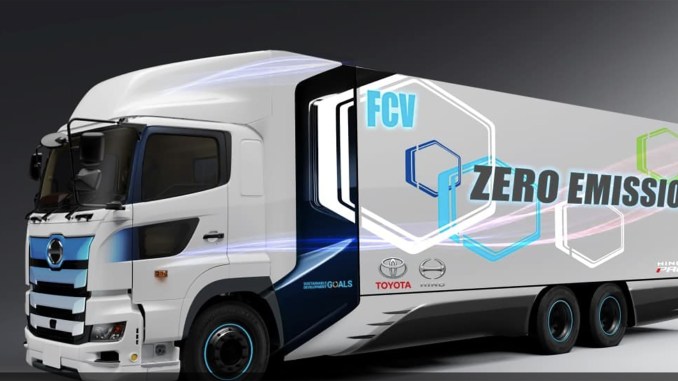
Global automotive giant Toyota and its truck subsidiary, Hino have announced that they are working together on fuel cell trucks for Japan in what is a similar project to the one Toyota has been engaged in with Kenworth in the United States.
Toyota and Hino have jointly announced and gone public with the program this week, after they apparently began work on it back in October last year.
Toyota and Hino say they hope to have running prototypes on Japanese roads this year and while commercial production is possible, they have not mentioned a timeline was.
Toyota, which has produced hydrogen fuel cell vehicles including the Mirai car and its collaboration with Kenworth, not to mention its Hydrogen fuel cell buses developed for the now postponed Tokyo Olympics, will be in charge of the fuel cell system and controls. Hino will work on the cab, chassis and other truck structural components.
The Hino Hydrogen fuel cell prototype truck will include hydrogen tanks, the fuel cell electricity generator, a high-voltage battery and the all-important electric motor and is based on Hino’s 700 series or as it is known in Japan the Profia model.
Two fuel cell stacks developed for the next-gen Mirai fuel cell car would provide a traveling range of approximately 600 kilometres with a manageable store of hydrogen to power the fuel cell stack.
Toyota and Hino declined to discuss the location of the tanks, the truck’s payload, motor output or battery capacity. They also offered no information on production timing or pricing.
“Fuel cell trucks are needed globally, not just in North America,” said Andrew Lund, Toyota Motor North America chief engineer for research and development, who is working on the Toyota-Kenworth project.
Five of the 10 Kenworth trucks with Toyota fuel cell powertrains have been built so far and are in various stages of testing, according to Kenworth director of research and development Brian Lindgren.
The first Toyota Kenworth fuel cell truck was planned for commercial service this month, but naturally that has been impacted by COVID-19 work restrictions.
Toyota has been an early adopter and a leader in hydrogen-powered fuel cell vehicle technology and development and its Mirai fuel cell passenger car is available in California on a subsidized three-year/60,000km lease at $US389 a month with $US2,499 down with both maintenance and the hydrogen fuel are included in the lease price.
The Mirai fuel cell stacks developed in Japan are central to both of the Hino and Kenworth heavy-duty truck programs.
Toyota of course owns 50.1 per cent of Hino and considers its work with the subsidiary an internal project, allowing access to all Toyota technology, according to Andrew Lund.
By contrast, the Toyota provides the Mirai fuel cells and other equipment to Kenworth, which then assembles the proof-of-concept trucks at its base in Seattle, Washington for use in Southern California.
“The programs are managed completely separately,” Lund said.
Toyota’s plans to have 100 Hino-designed fuel-cell powered buses in use at the Olympic Summer Games in Tokyo were put on the shelf following the announcement that the Games were to be postponed until 2021 because of the pandemic.
In January Toyota also announced at the US Consumer Electronics Show that it is building a 70 hectare hydrogen city located at the foot of Mount Fuji.
The development to be called Woven City, will be populated by Toyota employees and their families, retirees, scientists, and researchers, and will be adjacent to the Fuji Motor Speedway which is owned by Toyota.
The name Woven City harks back to Toyota’s early origin as a manufacturer of automatic weaving looms and it says it will be a fully connected ecosystem
Woven City’s buildings will be made mostly of wood, using traditional Japanese wood joinery combined with robotic production. The rooftops will be covered in photo-voltaic panels to generate solar power in addition to power generated by hydrogen fuel cells.
.




